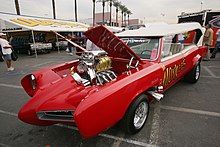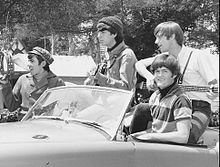
David Thomas Jones was an English actor and singer. Best known as a member of the band the Monkees and a co-star of the TV series The Monkees (1966–1968), Jones was considered a teen idol.

Robert Michael Nesmith was an American musician, songwriter, and actor. He was best known as a member of the Monkees and co-star of their TV series of the same name (1966–1968). His songwriting credits with the Monkees include "Mary, Mary", "The Girl I Knew Somewhere", "Tapioca Tundra", "Circle Sky" and "Listen to the Band". Additionally, his song "Different Drum" became a hit for the Stone Poneys featuring Linda Ronstadt.

The Monkees were an American pop rock band formed in Los Angeles in the mid-1960s. The band consisted of Micky Dolenz, Davy Jones, Michael Nesmith, and Peter Tork. Spurred by the success of TV series The Monkees, the Monkees were one of the most successful bands of the late 1960s. With international hits, four chart-topping albums and three chart-topping songs, they sold more than 75 million records worldwide.

George Michael Dolenz Jr. is an American musician and actor. He was the drummer and one of two primary vocalists for the pop rock band the Monkees, and a co-star of the TV series The Monkees (1966–1968). Dolenz is the last surviving member of the band.

Peter Halsten Thorkelson, better known by his stage name Peter Tork, was an American musician and actor. He was best known as the bass guitarist and keyboardist of the Monkees and co-star of the NBC television series of the same name (1966–68).
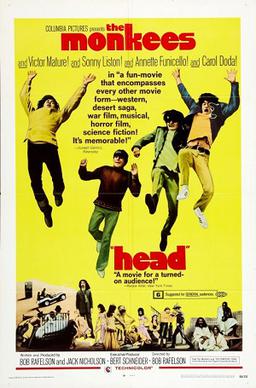
Head is a 1968 American satirical musical adventure film written and produced by Jack Nicholson and Bob Rafelson, directed by Rafelson, starring television rock group the Monkees and distributed by Columbia Pictures. A theatrical spin-off of the 1966–68 NBC television show and a swan song, it started production directly after completion of series production.

The Lincoln Futura is a concept car promoted by Ford's Lincoln brand, designed by Ford's lead stylists Bill Schmidt and John Najjar, and hand-built by Ghia in Turin, Italy — at a cost of $250,000.

George Barris was an American designer and builder of Hollywood custom cars. Barris designed and built the Hirohata Merc. Barris's company, Barris Kustom Industries, designed and built the Munster Koach and DRAG-U-LA for The Munsters; and the 1966 Batmobile for the Batman TV series and film.

Pool It! is the tenth studio album by American pop rock band the Monkees, released in August 1987 by Rhino Records. It was the first Monkees studio album of new material since Changes in 1970 and the first Monkees album to feature Peter Tork since the 1968 Head soundtrack.

"Valleri" is a song written by Tommy Boyce and Bobby Hart for the Monkees. The single peaked at #3 on the Billboard Hot 100 and spent two weeks at #1 on the Cash Box chart in early 1968, and reached #1 in Canada and #12 in the UK.
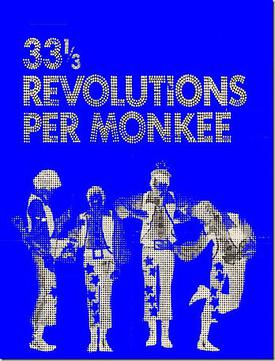
33+1⁄3 Revolutions per Monkee is a television special, starring the Monkees, which aired on NBC on April 14, 1969. The musical guests on the show included Jerry Lee Lewis, Fats Domino, Little Richard, the Clara Ward Singers, the Buddy Miles Express, Paul Arnold and the Moon Express, and We Three in musical performances. It was produced by Jack Good.

"Pleasant Valley Sunday" is a song by Gerry Goffin and Carole King, recorded and released by the Monkees in the summer of 1967. Inspired by their move to West Orange, New Jersey, and named for a street there, Goffin and King wrote the song about their dissatisfaction with life in the suburbs.
Edward Dean Jeffries was an American custom car designer and fabricator, as well as stuntman and stunt coordinator for motion pictures and television programs based in Los Angeles, California.

The Monkees is an American television musical sitcom that first aired on NBC for two seasons, from September 12, 1966, to March 25, 1968. The series follows the adventures of four young men trying to make a name for themselves as a rock 'n roll band. The show introduced a number of innovative new-wave film techniques to series television and won two Emmy Awards in 1967, including Outstanding Comedy Series. The program ended in 1968 at the finish of its second season and has received a long afterlife through Saturday morning repeats and syndication, as well as overseas broadcasts.
Dick Dean, born Richard Dean Sawitskas [Sa-WITS-kas], was an American automobile designer and builder of custom cars.

Model Products Corporation, usually known by its acronym, MPC, is an American brand and former manufacturing company of plastic scale model kits and pre-assembled promotional models of cars that were popular in the 1960s and 1970s. MPC's main competition was model kits made by AMT, Jo-Han, Revell, and Monogram.

Summer 1967: The Complete U.S. Concert Recordings is a four-CD compilation of live recordings by the American pop rock band the Monkees, released in 2001 by Rhino Handmade. Recorded during the band's summer 1967 tour, the CD was a limited edition release, with 3,500 copies being made available. 16 of these tracks had previously been compiled by Rhino and released as Live 1967 in 1987.

An Evening with The Monkees: The 45th Anniversary Tour, also called Here They Come!: 45th Anniversary Tour, was the fourth and final reunion tour by American pop rock group the Monkees, including Davy Jones, Micky Dolenz, and Peter Tork. Jones died of a heart attack on February 29, 2012. It was the group's first tour in a decade following Monkeemania, which ran from 2001 to 2002. The tour visited the United Kingdom, the United States and Canada. Due to the success of the first North American leg, a second leg was planned for the fall of 2011; however, dates were suddenly cancelled without explanation.
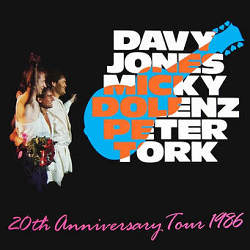
20th Anniversary Tour 1986 is a live album by the Monkees recorded during their 20th anniversary tour in 1986. To date, it is the only known complete concert recorded during this era. The recording was available at 1987 tour stops in double-LP and cassette formats, though a planned 1988 retail release by Rhino Records was ultimately scrapped. The record credited the artists as Davy Jones, Micky Dolenz, Peter Tork to avoid paying royalties to Arista Records who owned the Monkees trademark at the time, though the band's logo is visible on the sleeve. A limited-edition CD was released in 1994 under the title Live! by the group's fan club in Nashville, and was sold at concerts during their 1996 tour.
"Words" is a song written by Tommy Boyce and Bobby Hart and released by the Monkees. An early version by the Leaves appeared on their 1966 album Hey Joe. The Monkees first recorded the song for their second album, More of The Monkees, in August 1966 under the supervision of Boyce and Hart. While this version went unreleased until the 1990 compilation Missing Links Volume Two, it was featured in the 10 April 1967 episode of The Monkees "Monkees, Manhattan Style". A new version of the song was made to be the B-side of "Pleasant Valley Sunday" in 1967, now produced by Chip Douglas.
